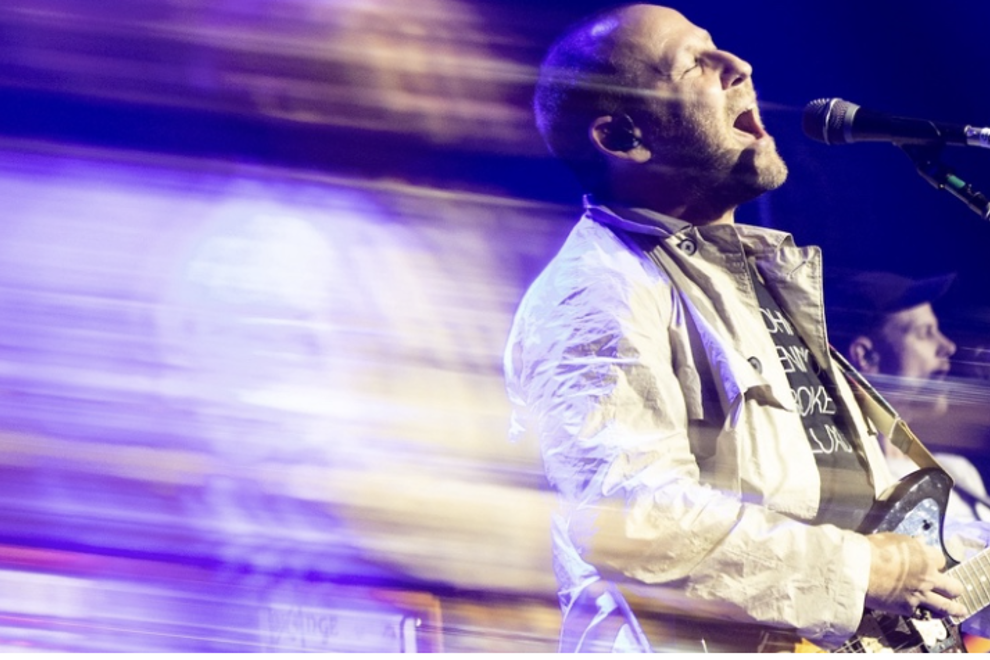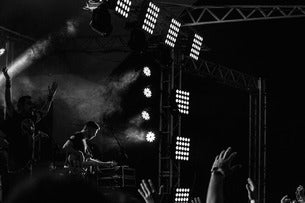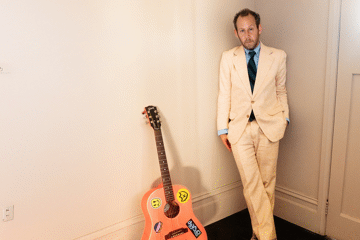 Ben Lee
Ben LeeThe Regional & Remote Music Summit kicked off into full force on Thursday, delivering it with it a raft of indispensable information in regard to the music scene that exists beyond the capital cities.
For its sophomore year and supported by MusicNSW this time around, the conference took over noted live music town and van bohemia Byron Bay following a successful 2024 debut in Darwin, with the first day containing a stacked line-up of researchers and entrepreneurs.
But of course, what would a summit about music be without its main source of musicianship? And now, industry stalwart Ben Lee can now add ‘headlined a conference’ to his very long list of achievements.
Speaking to media expert Mel Bampton in a candid solo session titled Ben Lee On The Magic (& Madness) Of Touring, the singer-songwriter delivered a wry, wide-ranging reflection on his three-decade career.
Don't miss a beat with our FREE daily newsletter
A highly-decorated veteran of the Aussie scene, Lee’s career is one that sprouted from as young as age 14 and has seen DIY and street press punk beginnings, Hottest 100 badges, international success, and branching into other areas of the industry from off the mic.
Creative Momentum Comes From Restlessness and Risk
Ben Lee is a bit like the Snoop Dogg of Australia in a sense that he’s a man who has done everything.
Known best for his solo music project, he’s also ventured into many a side-quest such as co-forming band The Bens with Ben Folds (Ben Folds Five) and Ben Kweller (Radish), writing a children’s album on religious tolerance, producing a comedy album for Margaret Cho, and for his latest venture – the podcast Weirder Together with partner Ione Skye.
He’s also known for keeping close ties with many industry legends across the arts, from Meg Washington, Josh Radnor, Sean Lennon, Zooey Deschanel and Sarah Silverman to name but a few, meanwhile name-dropping several Australian music favourites across his Thursday session.
With success being so subjective and ever-changing, what do the goalposts now look like to a nearly 47-year-old Lee?
“I mean, I've had so many different versions of success that I've chased, and in some ways, that's sort of what's fun about it,” he says. “Like, every album, I've had different benchmarks;, every tour, I've had different benchmarks; and sometimes you get people get in your ear, and you experiment with betraying your own intuition. And that's a really worthy experiment. I suggest everybody try that at least a few times, because you will never know how hot the stove is until you touch it directly.
“What is success? I mean, I support my family doing music. As I get older, I realise how few people could do that. Like you used to look at like “Oh, Dave Matthews has a chef and a yoga teacher on tour”, and you start thinking that that's success.
“And then you realise, like, there is less than 1% of musicians who can support themselves and their family, put food on their table, doing what they love, and get to make the music they want to make too! So that has really become the foundation of what I think success is.”
Lee’s comments sync into the tone of the summit, and for that matter, the industry in general, if the goal of job stability is largely unsuccessful, and leaves a thread to be pulled at with how to go about the issue.
Validation Across Genres and Generations
Before the Ben Lee of now, there was teenage faced Ben Lee of Sydney band Noise Addict. Lee and his bandmates faced not only coming into an industry completely new to it, but also navigating it at ages as young as 14 when connections are hard to come by and mingling at 18+ gigs is not an option.
Lee recalls his earliest industry advice coming from street press magazines, having learnt ill-tailored tips on how to send a demo to record labels.
“They said, ‘Write down the names and addresses on your favorite albums of all the labels,” he recalls. “And then there's a thing called a bio, where you write it in the third person of the story. And then there's photos you should do, which it said you should do them up against the wall. So I got my band to stand up against the wall.”
While the advice was limited, Lee claimed it was the validation from peers that actually kept him motivated to learn.
“A lot of those experiences actually were, like, extremely validating for me,” he said of receiving encouraging responses from favourite bands the Hard-Ons and The Welcome Mat after sending them demos for fun.
“When people ask me about my involvement with younger artists and all that, it's all directly traceable, to me, to positive reinforcement and validation I got from other artists. And I just saw how much that meant. I just thought, why wouldn't you want to be on the side of creating those experiences?”
Lee is aware that, despite the generation divide, many of his peers feel the same. “I was hanging out with Mallrat, Cub Sport, Georgia Maq, Gordi… and Grace—Mallrat—said, “You’re the only one of your generation who wants to hang out with us,’”” he says. “And I was like, ‘Oh my god. My generation thinks you don’t want to hang out with them!’
“Everyone wants connection and dialogue, and particularly the sharing of experiences.”
So, how do you connect across generations in a fractured industry? “Memes,” Lee jokes, before digging into a more serious point: “If [another artist] has smelled the blood of an audience, they know what that feels like.”
Live performance, he said, is the great equaliser. “It’s hand-to-hand combat. That’s what playing live is,” he said. “You get out there, and it’s dangerous. That chaos is what bonds us.”
Touring Has Changed – And Stayed the Same
Bringing the summit into relevance, Lee mentions how his regional touring has intensified in recent years, particularly following the era of COVID snap-lockdowns. He credits this time, and his restlessness, with having him explore NSW more than previously, and in venues he’d never have been to.
But while data is now king in the touring zeitgeist, Lee says this doesn’t always transfer to music audiences outside of young metro demographics. That doesn’t really work for
“You just don’t know,” he shrugs, telling the audience about a Byron show with poor pre-sales that ended up packed. “There’s the culture of all these spaces. You learn the rules of battle in battle,” he adds, encouraging trial-and-error for the learning curve.
But in the case of regional and remote shows, he stresses that local connections are infinitely more valuable than any online metrics.
“It used to be more common that the promoter – like the venue – is independently owned, but the promoter is an independent person, and so they had genuine skin in the game in getting people to that show, that show specifically. And that's the punk underground touring model, and what I've seen is that actually regional touring of Australia is a little bit of a throwback to that.”
Lee sets the stage for a spontaneous example of a regional booking, adding “They have real skin in the game, and I don't know how they got the people there! It's like, however they did it, they do a much better job than someone who's working with these more corporate, national, international promoters, where it's all just a balance sheet against everything else, and it doesn't really matter, you know.”
Why Playing Live Matters More Than Ever
Speaking more into the direction we’re heading with the chokehold that social media and AI are having, Lee sees live performance as the one thing that can’t be faked.
“I started feeling like, wow, the people I was getting excited to see were where there was danger of it falling apart,” he said, recalling the growing popularity of backing tracks at live gigs and their overcompensation of the ‘perfect’ live sound. “Doing that solo a little bit longer, or whatever... all that stuff we used to take for granted is now more rare.”
Audiences, he’s found, want to share space and spontaneity. “I realised the audience was just coming to hang out in the room, and they wanted something to happen, and they didn't even care what song. Okay, I have to play Catch My Disease and Cigarettes Will Kill You, but aside from that, the audience could not care less, as long as I was having a blast and it was something new happening.
“And I just think that in that, if you can harness that, if you can make something happen in a room, you will always be employed.”
Lee had some strong words for artists forcing themselves to play the algorithm game: “I meet artists who say, ‘I know I have to get on TikTok,’ and I’m like, ‘Please don’t, not with that attitude. No one’s going to want to watch your videos.’”
Instead, he urged artists to do what energises them. For him, that’s solo shows without setlists, sound crew, or merch. “I could make more money schlepping vinyl and T-shirts,” he admits, “but I’d rather enjoy my night.”
How to Survive Touring Without Losing Yourself
Fully embracing his new mentor perspective after three decades in the music industry, Lee doubles down on that absolute need for connection between artists.
That ethos extends to nurturing community, especially across regional and remote spaces. “I actually think community between like minds is really, really important,” he explains. “If you're from your little town and you've got an audience there and you really like an artist from 200 kilometres away, reach out to them, invite them to come and play in your town and go play in theirs.
“Creating networks of like minds is one of the things that will get you past the hurdles and self-doubt in those dark moments because you will have dark moments.”
Lee’s final advice to artists was in true Ben Lee style, as sincere as it was goofy, urging budding musicians that fun comes first. “So many artists have internalised external metrics of success that fun seems far down the priority list,” he says. “At the end of the day, when I go see music, I want to see artists enjoying themselves.”
He recalled a quote from the Grateful Dead’s Jerry Garcia that guides his own compass: Does it sound fun or not? “It might sound superficial,” Lee added, “but it’s a compass we all possess.”
But the metrics and the journey of fun and success are, as Lee emphasises, subjective to the interpretation of the beholder.
“You can be a better leader if you don't enforce your viewpoint on people you know? And you just go like, “this is how I see it, but you make your own decisions, your career, do whatever you want to do.”
“It's a very personal journey, it's a very private journey and just go out and take it and learn it and learn your personal lessons and don't worry about everyone telling you how it has to be done.”
This piece of content has been assisted by the Australian Government through Music Australia and Creative Australia, its arts funding and advisory body






















